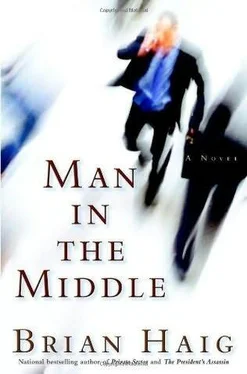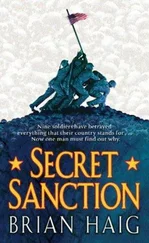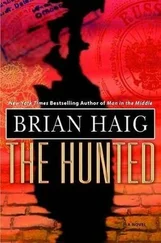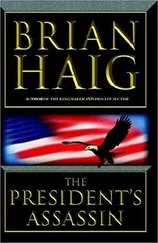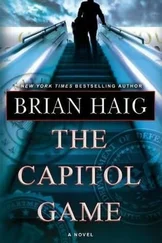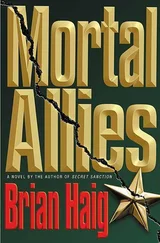Brian Haig - Man in the middle
Здесь есть возможность читать онлайн «Brian Haig - Man in the middle» весь текст электронной книги совершенно бесплатно (целиком полную версию без сокращений). В некоторых случаях можно слушать аудио, скачать через торрент в формате fb2 и присутствует краткое содержание. Жанр: Триллер, на английском языке. Описание произведения, (предисловие) а так же отзывы посетителей доступны на портале библиотеки ЛибКат.
- Название:Man in the middle
- Автор:
- Жанр:
- Год:неизвестен
- ISBN:нет данных
- Рейтинг книги:4 / 5. Голосов: 1
-
Избранное:Добавить в избранное
- Отзывы:
-
Ваша оценка:
- 80
- 1
- 2
- 3
- 4
- 5
Man in the middle: краткое содержание, описание и аннотация
Предлагаем к чтению аннотацию, описание, краткое содержание или предисловие (зависит от того, что написал сам автор книги «Man in the middle»). Если вы не нашли необходимую информацию о книге — напишите в комментариях, мы постараемся отыскать её.
Man in the middle — читать онлайн бесплатно полную книгу (весь текст) целиком
Ниже представлен текст книги, разбитый по страницам. Система сохранения места последней прочитанной страницы, позволяет с удобством читать онлайн бесплатно книгу «Man in the middle», без необходимости каждый раз заново искать на чём Вы остановились. Поставьте закладку, и сможете в любой момент перейти на страницу, на которой закончили чтение.
Интервал:
Закладка:
"Well… it is hard being great."
This pissed him off, as it was meant to. He said, "You think the world is your big playground. Your ignorance is awesome. There is an Arab saying that translates something like this-the big man can never see through the eyes of the small man."
"Maybe the big man has a better view."
He stared at me a long time, then he turned to Bian. "I am sure you understand. Look what American power and arrogance did for your homeland, your people."
Bian replied, very wisely, "Stick to the here and now."
"Yes… as you wish. Here-we Saudis opened our soil for your military bases, we gave you our diplomatic support, and for decades we have fed your insatiable worship of big cars and big homes with cheap oil. Which brings us to now-how does your President repay our gifts, our generosity, our friendship?"
I suspected he would tell us, and in fact he said, "Now he openly declares the inferiority of our government. Now he preaches about spreading democracy to our kingdom. Because you have found no nuclear or chemical weapons in Iraq, now he shifts his reason for this war, and now it is about spreading democracy. Who does this fool think his democracy would replace? Is he so blind and stupid he does not know he is threatening our royal family?"
Phyllis was visibly tiring of this sidetrack into political dialectics. She interrupted and said, "Come to the point, Turki."
He stared at her a moment. "This is the point. There are factions in the royal family-growing factions-who believe we have made a terrible blunder befriending America. And they believe America is manufacturing an astounding disaster in Iraq, a mistake that will be our ruin. The Shiites are coming to power, and already you are tired of this war, and you cannot wait for your soldiers to pull out, to depart. Who do you think the Iraqi Shiites will turn to for protection from the Sunnis?"
He was on a roll, relishing this chance to lecture ignorant Americans, and once again he answered his own question. "The Persians. Iran. All of the Gulf States-all of the great oil-producing states-we all will face destruction. Imagine over half the world's oil in the hands of the mullahs in Tehran. America is committing economic suicide." He paused then added, more ominously, "You are committing suicide for all of us."
Phyllis had had enough of his commentary and asked, "These two princes, Ali and Faud, were they giving money and aid to Zarqawi?"
He drew a few breaths and said, "This… I cannot say this for sure."
"What can you say?"
"It is possible, maybe, that they, and maybe others… maybe they have decided that the Shiites cannot be allowed to rule Iraq."
Arabs rarely answer a question directly, especially an embarrassing one. You have to listen closely, cut through the elliptical bullshit, and apply the rule of opposites; no means yes, yes means maybe, and maybe can mean maybe, or it might mean none of your business. Phyllis asked, "Others?"
"Maybe."
"Who are these others?"
"I have no idea." Translation-for him to know, and us not to find out.
"Who are these two princes?"
Here was a question he didn't want to hear and he couldn't evade. But since we already knew their names, we could, and obviously, we would, find out through our own sources. So for once he answered directly and unequivocally. "Prince Faud is the third son of the defense minister. Prince Ali is the second son of the oil minister."
He watched our faces, studying our reactions. He had previously asserted that the princes were themselves insignificant figures- which might or might not be true-but their daddies were two of the most powerful and influential men in the kingdom, and in a land where lucky sperm is the ticket, this made their kids very important indeed.
In response to our silence, he assured us, "I can handle this. And I will handle this."
I was about to ask what he meant by that when Bian leaned across the table. She said, "You had an intelligence file on bin Pacha. Why? Why was bin Pacha under an intelligence watch?"
He treated her question as irrelevant. "We observe all returning mujahideen. Nothing is suspicious about this. These men who have come back from Afghanistan, Somalia, Bosnia, and Chechnya, they pick up… strange ideas."
In other words, the Saudis had no problem exporting jihadis, but big issues when jihadis came home.
"How long were you watching bin Pacha?" asked Bian.
"It began, I believe, after his return from jihad in Somalia."
Bian's fingers were tapping the table, and she said sarcastically, "You believe?"
"My bureau handles external security, not internal… and so I cannot say this for sure. As I said, it was routine."
"Ten years?"
"Perhaps. Not continuously, though, or even very thoroughly. He was merely one of thousands of our returned mujahideen." The irony of this statement eluded him, and after a moment he added, "You saw his file. He raised no particular concerns or alarms."
This statement was so blatantly disingenuous I had to laugh.
He did not like this and gave me a nasty look.
"Yet," Bian noted, "when you learned he was about to be apprehended, your ambassador rushed to the White House and intervened. If this… if Ali bin Pacha was beneath your radar, why go to such extraordinary trouble?"
Another question he didn't want to hear. In fact, I had not put this piece together, and Bian's analysis caught me by surprise-not the fact that the Saudis wanted to hide bin Pacha's secrets, per se; something else. It caught him by surprise as well, and he simply stared at her.
Since he was no longer answering, Bian answered for him. "You were aware bin Pacha was part of a terrorist cell and you knew rich Saudis were giving him money. Until he was about to be captured, you didn't care, or… you did care, and approved of his activities."
"This is speculation. Completely absurd."
She kept her eyes on his face.
I also was studying al-Fayef's face. He was too much the veteran professional to do something stupid, like look guilty, or even more stupidly, confess. But he did lick his lips a few times, and with a shaky hand he fumbled out a fresh cigarette and lit it.
He turned to Phyllis and insisted, "I have nothing more to say. Now you must tell me what you intend to do."
Actually, he'd told us as minimal truth he could get away with: a careful mixture of what we could learn on our own, what was intuitively obvious, and what any intelligent regional expert could divine from the facts. The problem for us, and the bigger problem for him, was what he didn't tell us, but that Bian had just surmised.
Regarding Phyllis, as usual her eyes conveyed one emotion, her lips another, and neither betrayed what probably was in her heart, or in her head. I was sure she was angry, frustrated, and worried. But for Phyllis, emotion and logic were never at war; it just never occurred to her that reason has a peer, or that emotion should incubate action. She announced unequivocally and, I thought, predictably, "What's done is done. We move forward."
Bian asked, "What does that mean?"
"It means what it means."
"What about justice?"
"For who?" Phyllis asked.
"For the soldiers who are fighting. For those who are dead. For their families, for their loved ones. For America."
"There is no justice for dead soldiers," Phyllis replied with typically chilling logic. "They are not murder victims-they're casualties of war."
"The Saudis have been feeding money, people, and who knows what to their killers. We now have the names of two princes." Bian looked in al-Fayef's direction and added, "It sounds like there are more names, and possibly the Saudi government's implicated as well. You can't ignore or paste over that."
Wrong, because Phyllis turned to al-Fayef and said, "It's not in our interest to expose the royal family to… embarrassment."
Читать дальшеИнтервал:
Закладка:
Похожие книги на «Man in the middle»
Представляем Вашему вниманию похожие книги на «Man in the middle» списком для выбора. Мы отобрали схожую по названию и смыслу литературу в надежде предоставить читателям больше вариантов отыскать новые, интересные, ещё непрочитанные произведения.
Обсуждение, отзывы о книге «Man in the middle» и просто собственные мнения читателей. Оставьте ваши комментарии, напишите, что Вы думаете о произведении, его смысле или главных героях. Укажите что конкретно понравилось, а что нет, и почему Вы так считаете.
